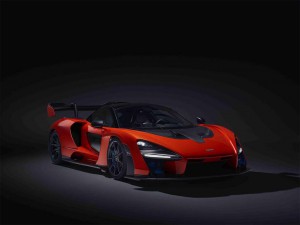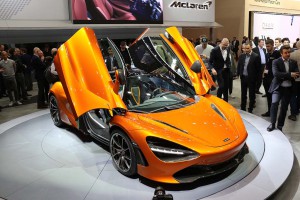McLaren Automotive, the maker of some of the world’s most expensive sports cars and supercars, posted record sales by selling 3,340 cars worldwide in 2017.
The continuing success of the McLaren has made the company the largest part of the British-based McLaren Group, which traditionally has thrived on racing-related business and selling applied technology.
“Demand has been strong for McLaren Automotive across our product families in 2017 with interest particularly robust in our biggest market, North America,” said Mike Flewitt, chief executive officer of McLaren, as 1,234 cars in North America compared with 1,139 in 2016.
Flewitt said the Sports Series family, the entry point for the McLaren brand, has been successful in attracting new customers. “With a strong order bank stretching well into this summer it is expected that close to half of 2018 sales will derive from the Super Series,” Flewitt said.
(From track to street, new Senna is McLaren’s most extreme machine yet. Click Here for more.)
“Meanwhile, the Ultimate Series continues to surpass our expectations with a completely full order book for both the newly unveiled McLaren Senna and other future model codenamed BP 23.

McLaren's new Senna is a $1 million hypercar with a 500-unit production run that is already sold out.
“We are continuing to invest heavily in research and development – 1 billion pounds over six years – as part of our ambitious Track 22 business plan that sets out and supports our growth,” he added. “Long term, the plan will see us launching 15 new car and/or derivatives up to 2022.”
Flewitt said McLaren also will continue to develop during with the opening of a second production center in Yorkshire, England, which will be fully operational in 2019, and allow the company to manufacture carbon-fiber tubs that are the heart of the company’s cars. McLaren was to the first vehicle builder to use carbon fiber in Formula One racing but it is also crucial to its ultra-luxury performance vehicles.
“Making cars lighter as well as the increasing use of hybrid powertrains are the future of vehicle design,” he said, and McLaren has staked out an excellent position to capitalize on both trends.
(Click Here for a look at the new McLaren 720S.)
Around two-thirds of sales are attributed to the Sports Series family, the vast majority of which are new buyers to the brand, with the rest coming from the Super Series.
To support an increase in customer demand and new model launches, a second shift was introduced in 2016 at the McLaren Production Centre (MPC) in Woking, Surrey, where each car is hand-assembled before being delivered through over 80 retailers in 30 markets around the world. The MPC is now building up to 20 cars a day.
McLaren also continued to expand its global retailer network with additional and updated facilities opening including in Bahrain, Montréal and Denver, along with the confirmation of a new Barcelona showroom.
In addition, and in recognition of the brand’s commitment to North America, the US saw the opening of a new 7,500-square foot North American Regional Distribution Center, which became the first McLaren parts distribution center outside the company’s UK headquarters.
(McLaren teases next-gen P15 hypercar. For a look, Click Here.)
To serve customers engaging with the sport in the best possible way, McLaren Automotive has appointed a network of specialist motorsport retailers who will sell road and track products alongside each other. Also starting next year, owners will be able to compete in a one-make GT series.


Interesting